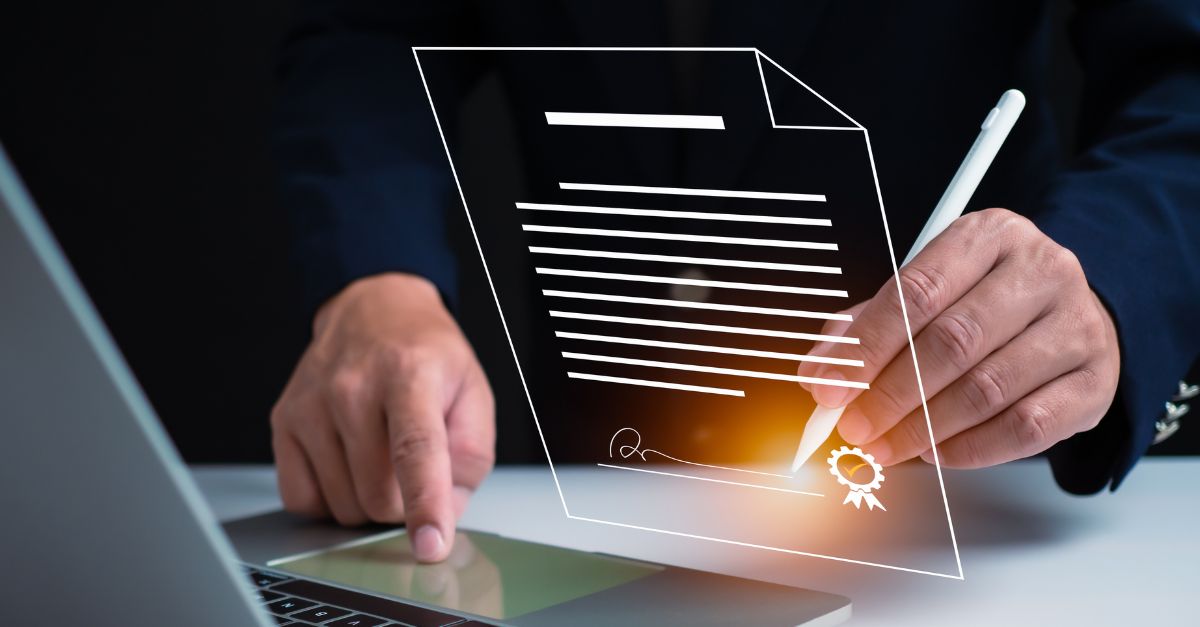Validating a transaction used to involve a significant investment of time, reams of paper, and numerous steps, after which the parties would affix their hand-written signatures.
Often the addition of a notarization process lent a greater degree of validation. Document copies were mailed to designated participants, and originals tucked into file cabinets to be retained in the records room of a business for years. The entire process could take many days to complete.
Today, digital technologies drive high expectations for expediency and convenience for businesses and consumers for their transactions and the transfer of important data. New digital capabilities replace time-consuming processes like in-person meetings to review documents or paying for a notary to legitimize them.
The progression of digitalization and workplace migration has increased the need for convenient and expedient transaction processes, as well as the need for higher levels of security. However, the same digital technology that delivers expediency, cost-savings, and time conservation for businesses and consumers can empower those with malicious intent.
Fraudulent activities can include generating false documents, signatures, identities, and document alterations. In the current climate of escalating cybersecurity threats, securing documents in a transaction with unalterable methods and the certainty of identity and signature authenticity are of vital importance.
Digital Identity Authentication Processes are a Crucial Security Measure
Establishing secure digital identities has become a next-level capability in bolstering data privacy and protection for individuals and businesses.
A digital identity is an electronic method of accurately and reliably identifying someone with a certificate containing public and private keys. That private key lets an individual sign an e-document with a signature that can be verified using the public key. Using a digital ID provides a much higher level of validation that the signee is authorized to provide an e-signature on a specific document.
The development and use of digital signatures offer the benefits of faster and more streamlined operations and transactions, increased cost-effectiveness, elimination of needless paper waste, and increased data and document security. While basic electronic signatures have offered convenience over traditional notarized signatures, they lack the security required for most transactions in today’s risky cyberspace.
The Security Difference of Using Certificate-Based Digital Signatures
Digital signatures and digital identity verification from a trusted third party known as a Certificate Authority (CA) use PKI-based digital certificates with spoof-proof, unalterable authenticity and integrity for signed documents. Advanced Electronic Signatures provide identity vetting and authentication and are issued by a recognized Trusted Service Provider (TSP) and as such are trustworthy. Beyond that, at the highest level of security, a Qualified Electronic Signature (QES) must be issued by an accredited, Qualified Trust Service Provider (QTSP).
A QES is recognized in the regulations of many countries worldwide as reliable, valid, secure, and legally equivalent to a handwritten signature. PKI cryptographic components within a digitally signed document cannot be altered or replicated, just like a human fingerprint.
Organizations that do not protect their transactions and documents with the most secure signing processes put themselves at greater risk of fraud, financial and reputational damage, and non-compliance penalties. Highly-regulated industries dealing in sensitive personal data, like healthcare and financial institutions, need to provide the highest level of security for authenticating identities and signatures across all document transfers and transactions.
Certificate-based digital signatures using PKI technology, issued from a trusted CA, offer the following security assurances:
- Identities have been accurately verified and bonded to the digital signature
- Documents are from a verified source and are authentic
- Documents are tamper-proof, with any alteration attempts displaying an “invalid signature” alert
GlobalSign is a Trusted Certificate Authority
As a worldwide leading provider in high-scale PKI and identity solutions and an Adobe Approved Trust Listed (AATL) CA our document signing solutions are designed to secure documents and streamline workflows with digital signatures and seals to provide confidence, integrity, and trust.
GlobalSign digital signatures and seals meet these global regulations and standards:
- US ESIGN (Electronic Signatures in Global and National Commerce)
- FDA CFR 21 Part 11
- US UETA (Uniform Electronic Transactions Act)
- US State Professional Engineering (PE) Seals
- UN Model Electronic Signature Law
- Sarbanes-Oxley (SOX)
- eIDAS (Advanced & Qualified e-signatures and eSeals)
- CNCA (Certification and Accreditation Administration of the People's Republic of China)







